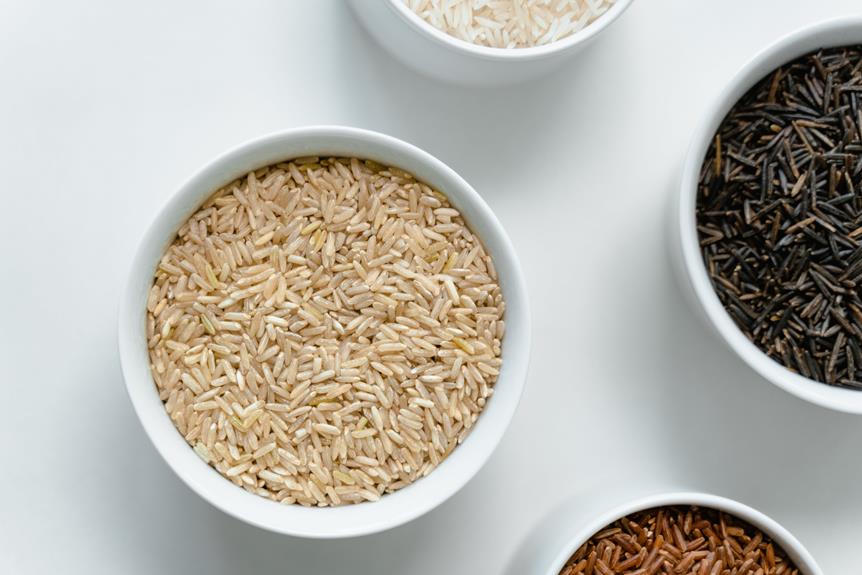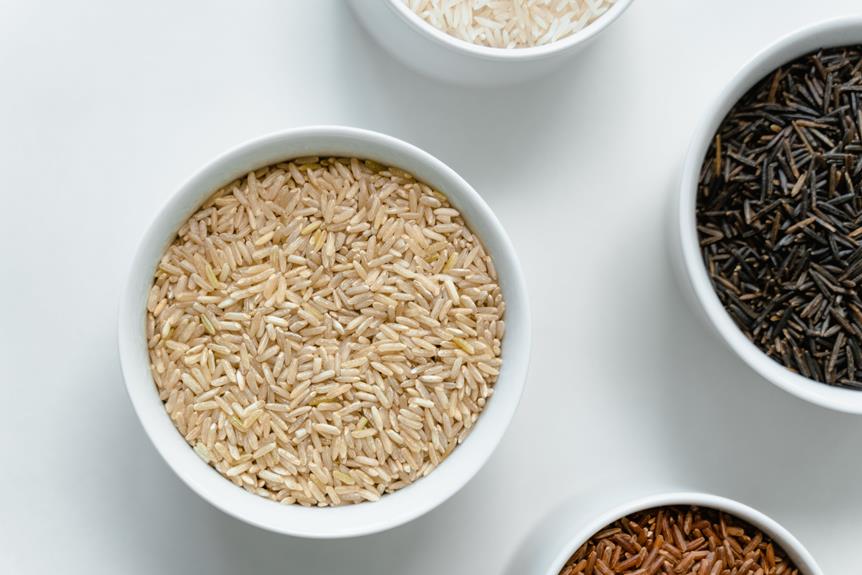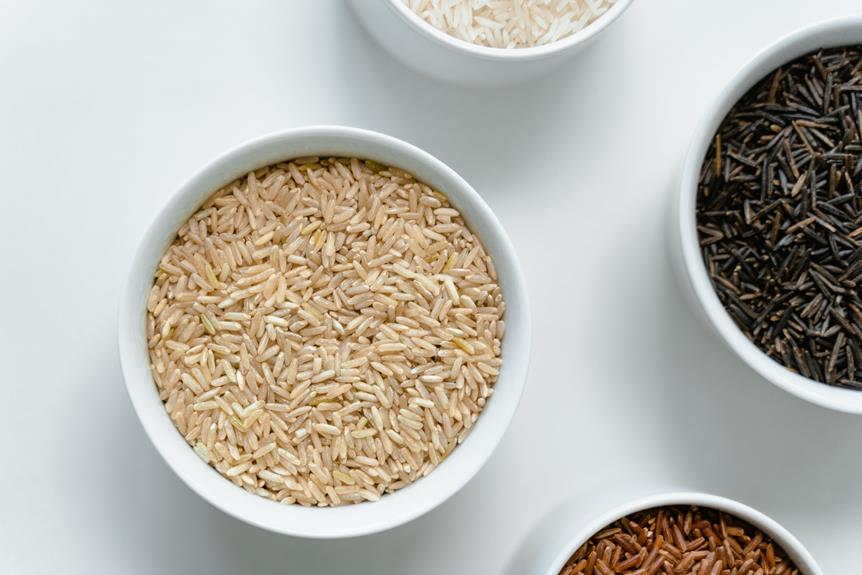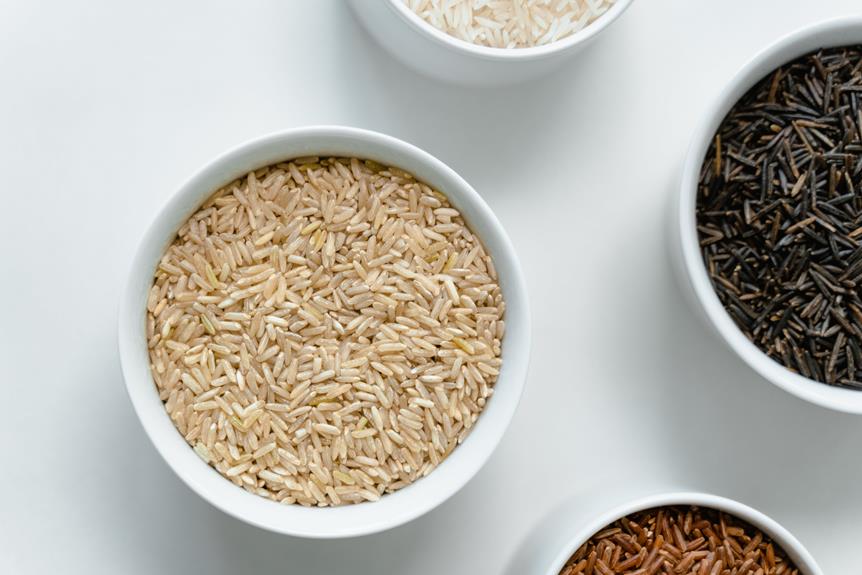Did you know that dietary fiber offers numerous benefits for your gut health? Not only does it help to keep your bowel movements regular, but it also increases stool bulk and prevents constipation. But that's not all – fiber can also provide relief from diarrhea and enhance the diversity of your gut microbiota. And if you're concerned about your risk of developing colorectal cancer or managing your cholesterol levels, dietary fiber can help with that too. Plus, it plays a role in regulating blood sugar levels and supporting weight management. Curious to learn more about how fiber can benefit your gut health?
Key Takeaways
- Dietary fiber promotes regular bowel movements and prevents issues like constipation and diarrhea.
- Fiber supports overall digestive health, preventing digestive issues like hemorrhoids and diverticulitis.
- Adequate fiber intake can reduce the risk of colorectal cancer by promoting colon health and enhancing the gut microbiome.
- Including fiber-rich foods in your diet can help manage cholesterol levels and regulate blood sugar levels.
Improved Bowel Movements
Including dietary fiber in your diet can help improve your bowel movements. Fiber is a type of carbohydrate that passes through your digestive system mostly intact, adding bulk to your stool and making it easier to pass. When you consume an adequate amount of fiber, it absorbs water and increases the size and weight of your stool. This helps stimulate the muscles in your intestines, promoting regular bowel movements.
Dietary fiber comes in two forms: soluble and insoluble. Soluble fiber dissolves in water and forms a gel-like substance in your gut. This type of fiber can help soften your stool and prevent constipation. Examples of foods high in soluble fiber include oats, beans, and fruits like apples and oranges. On the other hand, insoluble fiber does not dissolve in water and adds bulk to your stool. It helps move waste through your digestive system more efficiently, preventing issues like hemorrhoids and diverticulosis. Good sources of insoluble fiber include whole grains, vegetables, and nuts.
Including fiber-rich foods in your diet can also help regulate bowel movements if you struggle with diarrhea. Soluble fiber absorbs water and adds bulk to loose stools, making them firmer. It can help slow down the passage of food through your intestines, allowing for better nutrient absorption and reducing the frequency of loose stools.
To ensure you're getting enough fiber, aim to include a variety of fruits, vegetables, whole grains, and legumes in your meals. Gradually increase your fiber intake to give your body time to adjust, and drink plenty of water to help the fiber work effectively. Remember, a healthy digestive system starts with a diet rich in dietary fiber.
Increased Stool Bulk
Consuming an adequate amount of dietary fiber can significantly increase the bulk of your stool. This is because dietary fiber is not digested by your body, but instead passes through your digestive system relatively intact. As it moves through your intestines, it absorbs water and adds bulk to your stool, making it easier to pass and preventing constipation.
To help you visualize the effect of dietary fiber on stool bulk, here is a table highlighting different sources of dietary fiber and their approximate fiber content:
| Food Source | Fiber Content per 100g |
|---|---|
| Chia seeds | 34g |
| Lentils | 8g |
| Whole wheat bread | 6g |
As you can see, foods like chia seeds have a high fiber content, which can help increase stool bulk. Incorporating these fiber-rich foods into your diet can promote regular bowel movements and prevent constipation.
Increasing stool bulk through dietary fiber is beneficial because it helps to stimulate the natural contractions of your intestines, promoting regular bowel movements. It also helps to prevent the stool from becoming too dry and hard, which can lead to discomfort and difficulty in passing stool.
Remember to increase your fiber intake gradually and drink plenty of water to prevent any digestive discomfort. Aim for a daily fiber intake of 25 grams for women and 38 grams for men, as recommended by the Institute of Medicine. By including fiber-rich foods in your diet, you can improve your gut health and maintain regular, healthy bowel movements.
Prevention of Constipation
If you want to prevent constipation, incorporating dietary fiber into your diet is crucial. By consuming an adequate amount of fiber, you can promote regular bowel movements and improve your digestive health. Fiber acts like a sponge, absorbing water and adding bulk to your stool, making it easier to pass.
Regular Bowel Movements
To maintain regular bowel movements and prevent constipation, incorporating dietary fiber into your daily diet is essential. Here are some reasons why:
- Fiber adds bulk to your stool, making it easier to pass through your digestive system.
- It helps regulate the frequency and consistency of your bowel movements.
- Fiber keeps your colon hydrated, preventing dry and hard stools.
- It promotes the growth of beneficial bacteria in your gut, which aids in digestion.
- It stimulates the muscles in your intestines, helping to move waste along more efficiently.
Improved Digestive Health
Incorporating dietary fiber into your daily diet is crucial for preventing constipation and improving your digestive health. Fiber adds bulk to your stool, making it easier to pass through your digestive system. By preventing constipation, fiber helps to regulate your bowel movements and maintain regularity. It acts as a natural laxative, promoting the smooth and efficient movement of waste through your intestines. Additionally, fiber helps to soften your stool, reducing the strain and discomfort associated with constipation. By keeping your digestive system healthy and functioning properly, fiber can also help to prevent other digestive issues, such as hemorrhoids and diverticulitis. So, make sure to include fiber-rich foods like fruits, vegetables, whole grains, and legumes in your daily diet to support your digestive health.
Relief From Diarrhea
Dietary fiber can provide relief from diarrhea by promoting healthy bowel movements. When you experience diarrhea, it can be uncomfortable and disruptive to your daily life. However, incorporating fiber-rich foods into your diet can help regulate your digestive system and alleviate this issue. Here are five ways in which dietary fiber can provide relief from diarrhea:
- Increased stool bulk: Fiber adds bulk to your stool, making it easier to pass and reducing the frequency of loose or watery bowel movements.
- Improved digestion: Fiber helps to slow down the digestive process, allowing your body more time to absorb water and nutrients from your food. This can help to firm up your stool and reduce diarrhea.
- Regulated bowel movements: Fiber acts as a natural regulator for your bowel movements by adding substance and structure to your stool. It can help prevent both constipation and diarrhea by promoting regularity.
- Balanced gut flora: Fiber acts as a prebiotic, nourishing the beneficial bacteria in your gut. A healthy balance of gut flora can improve digestion and reduce the risk of diarrhea.
- Soothing effect: Certain types of fiber, such as soluble fiber, have a soothing effect on the digestive tract. This can help to calm inflammation and irritation, providing relief from diarrhea.
Enhanced Gut Microbiota Diversity
When it comes to promoting a healthy gut, one of the key benefits of dietary fiber is its ability to enhance gut microbiota diversity. The gut microbiota refers to the trillions of microorganisms that reside in your digestive system, playing a crucial role in maintaining overall health. By consuming a diet rich in dietary fiber, you can support the growth and diversity of these beneficial bacteria, leading to a healthier gut environment.
| Beneficial Effects of Enhanced Gut Microbiota Diversity | How It Helps |
|---|---|
| Improved Digestion | A diverse gut microbiota helps break down complex carbohydrates and fiber, aiding digestion and nutrient absorption. |
| Enhanced Immune Function | Certain gut bacteria help regulate the immune system, promoting a balanced response and reducing inflammation. |
| Reduced Risk of Chronic Diseases | A healthy gut microbiota has been linked to a lower risk of conditions such as obesity, type 2 diabetes, and heart disease. |
Having a diverse gut microbiota is essential for maintaining optimal health. It allows for better digestion, as different types of bacteria have the ability to break down different types of fiber and carbohydrates. This breakdown process produces short-chain fatty acids (SCFAs), which provide energy for the cells lining your colon and have anti-inflammatory properties. Additionally, a diverse microbiota helps regulate the immune system, preventing excessive immune responses that can lead to chronic inflammation and autoimmune disorders.
Furthermore, a healthy gut microbiota is associated with a reduced risk of chronic diseases. Studies have shown that individuals with a more diverse gut microbiota have a lower risk of obesity, type 2 diabetes, and heart disease. This may be attributed to the fact that certain bacteria in the gut produce metabolites that influence metabolism and help maintain a healthy weight.
Reduced Risk of Colorectal Cancer
Did you know that consuming dietary fiber can help reduce your risk of developing colorectal cancer? It's true! One of the significant benefits of including fiber in your diet is its potential to prevent cancer. By promoting regular bowel movements and keeping your digestive system healthy, fiber helps protect your colon from harmful substances that can lead to cancer. Additionally, fiber contributes to the enhancement of your gut microbiome, further reducing the risk of colorectal cancer.
Cancer Prevention
Consuming an adequate amount of dietary fiber can significantly reduce your risk of developing colorectal cancer. This is because fiber plays a crucial role in maintaining a healthy digestive system and preventing the formation of cancerous cells in the colon and rectum. Here are five ways in which dietary fiber can help prevent colorectal cancer:
- Fiber promotes regular bowel movements, preventing the buildup of waste and toxins in the colon.
- It helps maintain a healthy weight, reducing the risk of obesity, a known risk factor for colorectal cancer.
- Fiber feeds beneficial gut bacteria, which produce short-chain fatty acids that inhibit the growth of cancer cells.
- It helps regulate blood sugar levels, reducing inflammation and lowering the risk of cancer development.
- Fiber binds to carcinogens and toxins, promoting their elimination from the body before they can damage the cells lining the colon and rectum.
Digestive System Protection
To further protect your digestive system and reduce the risk of colorectal cancer, incorporating dietary fiber into your daily diet is essential. Dietary fiber plays a crucial role in maintaining a healthy digestive system by promoting regular bowel movements and preventing constipation. Additionally, it acts as a protective barrier in the colon, preventing harmful substances from coming into direct contact with the colon wall. This reduces the risk of developing colorectal cancer, one of the most common types of cancer worldwide.
Here is a table that highlights some high-fiber foods that you can include in your diet:
| Food | Fiber Content (per serving) |
|---|---|
| Avocado | 9 grams |
| Lentils | 15.6 grams |
| Chia Seeds | 10.6 grams |
Enhanced Gut Microbiome
How can an enhanced gut microbiome reduce the risk of colorectal cancer? An enhanced gut microbiome can play a crucial role in reducing the risk of colorectal cancer by promoting a healthy environment in the digestive system. Here are some ways an enhanced gut microbiome can help:
- Increased production of short-chain fatty acids, which can inhibit the growth of cancer cells.
- Enhanced immune function, which helps to identify and eliminate cancer cells.
- Improved nutrient absorption, ensuring the body receives the necessary vitamins and minerals to maintain overall health.
- Reduced inflammation in the gut, which is associated with a lower risk of developing cancer.
- Enhanced detoxification of harmful substances in the colon, preventing the accumulation of carcinogens.
Lowered Cholesterol Levels
A high-fiber diet can help you lower your cholesterol levels. By incorporating more fiber-rich foods into your meals, you can make a positive impact on your heart health. Dietary fiber has been shown to reduce both total cholesterol and LDL cholesterol levels, also known as "bad" cholesterol. Here's how it works:
| Benefit | Explanation | Example Foods |
|---|---|---|
| Soluble fiber | This type of fiber dissolves in water and forms a gel-like substance in your digestive tract. It helps reduce LDL cholesterol. | Oats, barley, legumes, citrus fruits |
| Insoluble fiber | While it doesn't directly lower cholesterol, insoluble fiber aids in digestion and can indirectly support heart health. | Whole grains, nuts, seeds, vegetables |
| Fermentable fiber | This type of fiber is fermented by bacteria in your gut, producing short-chain fatty acids that can lower cholesterol production. | Artichokes, onions, garlic, bananas |
| Viscous fiber | Viscous fibers, such as beta-glucan, bind to cholesterol in your gut, preventing its absorption into the bloodstream. | Oat bran, barley, seaweed, chia seeds |
Incorporating a variety of these fiber-rich foods into your diet can have a significant impact on your cholesterol levels. Aim to consume around 25-30 grams of fiber per day for optimal heart health benefits. Remember to drink plenty of water alongside your fiber intake to help it move smoothly through your digestive system.
Lowering cholesterol levels is crucial for maintaining a healthy heart and preventing cardiovascular diseases. By making simple dietary changes and increasing your fiber intake, you can take an active role in improving your cholesterol profile and overall heart health.
Regulation of Blood Sugar Levels
By incorporating fiber-rich foods into your diet, you can also benefit from the regulation of blood sugar levels. Fiber plays a crucial role in maintaining stable blood sugar levels, which is especially important for individuals with diabetes or those at risk of developing the condition. Here are five ways in which dietary fiber helps regulate blood sugar levels:
- Slows down digestion: Fiber slows down the digestion of carbohydrates, preventing a rapid rise in blood sugar levels after a meal.
- Increases insulin sensitivity: Consuming fiber-rich foods improves insulin sensitivity, allowing the hormone to work more effectively in lowering blood sugar levels.
- Promotes a gradual release of glucose: Soluble fiber forms a gel-like substance in the digestive tract, which slows down the absorption of glucose into the bloodstream, preventing spikes in blood sugar.
- Enhances glycemic control: Studies have shown that a high-fiber diet can help individuals with diabetes achieve better glycemic control, leading to improved blood sugar management.
- Reduces the risk of type 2 diabetes: Regular consumption of fiber has been associated with a lower risk of developing type 2 diabetes. This is believed to be due to its ability to regulate blood sugar levels and improve insulin sensitivity.
Incorporating fiber-rich foods into your diet, such as fruits, vegetables, whole grains, legumes, and nuts, can provide you with these blood sugar-regulating benefits. Aim to consume a variety of fiber sources to ensure you're getting both soluble and insoluble fiber, as they each play a role in promoting healthy blood sugar levels. Remember to increase your fiber intake gradually and drink plenty of water to prevent any digestive discomfort.
Weight Management
Incorporating fiber-rich foods into your diet can support weight management goals. Fiber is an essential nutrient that can help you maintain a healthy weight by promoting feelings of fullness and reducing appetite. When you consume foods high in fiber, they take longer to digest, which means you feel satisfied for longer periods of time. This can prevent overeating and unnecessary snacking, ultimately aiding in weight control.
One of the main reasons why fiber is beneficial for weight management is its ability to increase satiety. Fiber absorbs water in your digestive system, forming a gel-like substance that slows down the emptying of your stomach. As a result, you feel fuller for longer, reducing the urge to eat more frequently. By incorporating fiber-rich foods into your meals, such as fruits, vegetables, whole grains, and legumes, you can effectively manage your weight by controlling portion sizes and avoiding excessive calorie intake.
Furthermore, high-fiber foods are generally lower in calories compared to their low-fiber counterparts. These foods tend to be more filling due to their high water and fiber content, which means you can consume a larger volume without consuming excess calories. For example, a serving of broccoli contains fewer calories than the same serving size of white bread. By choosing fiber-rich options, you can create meals that are satisfying and nutrient-dense while still supporting your weight management goals.
Frequently Asked Questions
How Much Dietary Fiber Should I Consume Daily to Experience the Gut Health Benefits?
To experience the gut health benefits of dietary fiber, you should consume an adequate amount daily. The recommended intake varies depending on factors like age and gender. Generally, adults should aim for 25-38 grams of fiber per day. However, it's important to gradually increase your fiber intake to avoid digestive discomfort. Remember to also drink plenty of water, as fiber needs liquid to work effectively. Consult with a healthcare professional for personalized advice.
Can Dietary Fiber Help With Other Digestive Issues Such as Acid Reflux or Indigestion?
Dietary fiber can indeed help with other digestive issues like acid reflux or indigestion. It can provide relief by promoting regular bowel movements, preventing constipation, and aiding in the digestion process. Fiber helps to bulk up the stool, making it easier to pass through the digestive system. It also absorbs excess stomach acid, reducing the likelihood of acid reflux. Including fiber-rich foods in your diet can be beneficial for improving overall digestive health and managing these issues.
Are There Any Potential Side Effects or Risks Associated With Consuming High Amounts of Dietary Fiber?
Consuming high amounts of dietary fiber can have potential side effects and risks. These include bloating, gas, and stomach cramps. It is important to gradually increase your fiber intake and drink plenty of water to avoid these issues. Additionally, if you have certain medical conditions such as irritable bowel syndrome or diverticulitis, consuming excessive fiber may worsen symptoms. It is recommended to consult with a healthcare professional to determine the appropriate amount of fiber for your specific needs.
Is There a Difference in the Gut Health Benefits Between Soluble and Insoluble Fiber?
There is indeed a difference in the gut health benefits between soluble and insoluble fiber. Soluble fiber dissolves in water and forms a gel-like substance in your gut, which can help regulate blood sugar levels and lower cholesterol. On the other hand, insoluble fiber adds bulk to your stool and helps prevent constipation. Both types of fiber are important for maintaining a healthy gut and promoting regular bowel movements.
Can Dietary Fiber Supplements Provide the Same Gut Health Benefits as Natural Sources of Fiber?
Dietary fiber supplements might not provide the same gut health benefits as natural sources of fiber. While they can help increase your overall fiber intake, it's important to remember that natural sources like fruits, vegetables, and whole grains also provide other important nutrients. These natural sources of fiber are also typically more easily digested and can contribute to a healthier gut microbiome. So, while supplements can be a convenient option, it's still best to prioritize getting fiber from whole foods.




